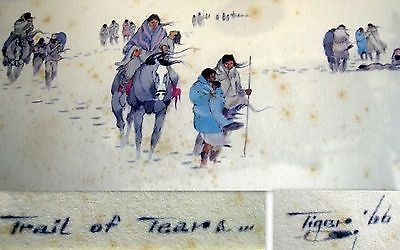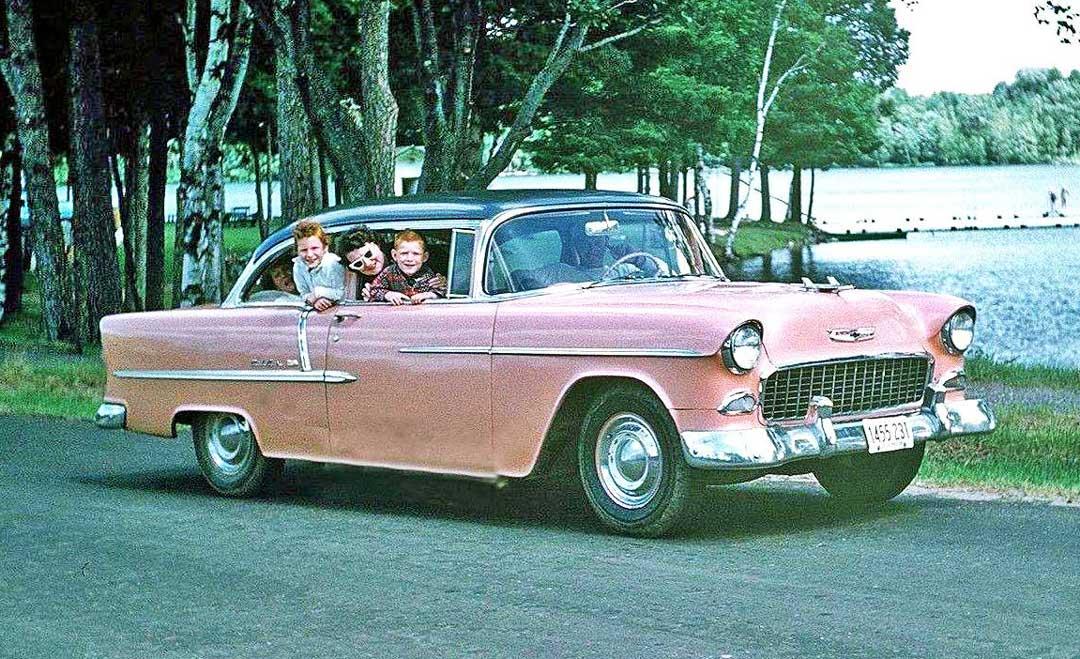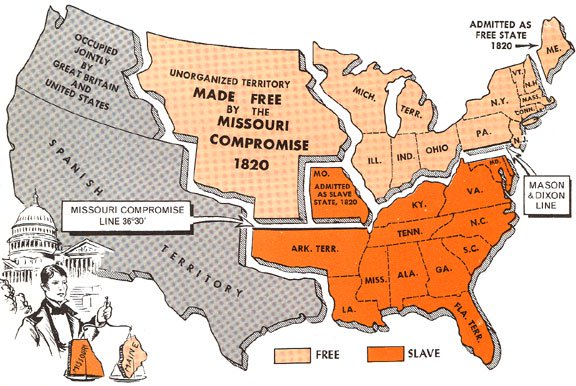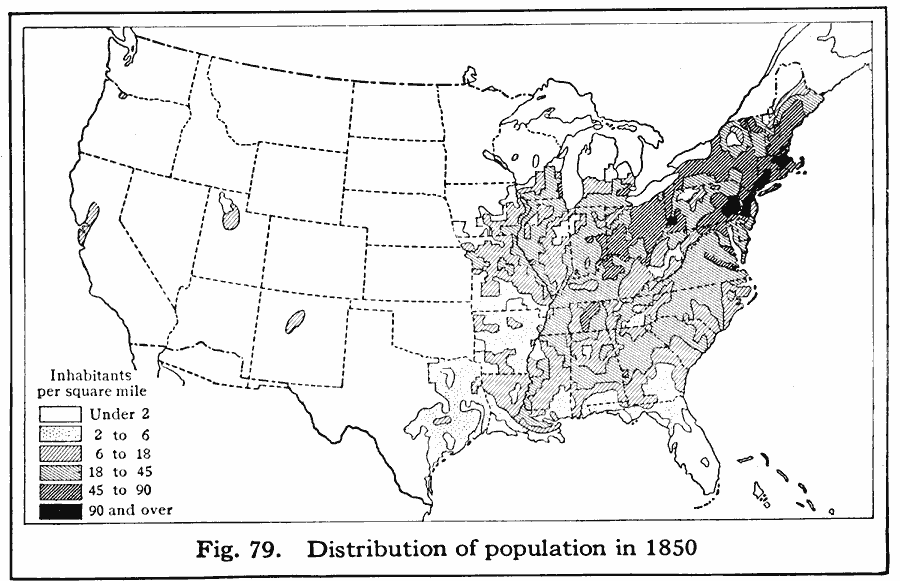
Cherry-picked versions of GOP history argue that the party has been unchanging in its support for black rights and ordinary Americans, but that's just not right. The long history of the GOP has been both glorious- as they argue- and sordid.
Let's have a look, shall we? /1
Let's have a look, shall we? /1
https://twitter.com/baseballcrank/status/1152220958041812992
The GOP organized in the 1850s. White northern man had long worried that rich southern slaveholders were taking over the government. In 1854, Congress passed the Kansas-Nebraska Act opening the West, which had been free under the Missouri Compromise, to slavery. /2 

They would create new slave states, overpowering free states. Soon rich men would own Congress. Poor white men would become serfs. The day after the K-N Act passed, N Reps from all parties joined to stand against the Slave Power, and ordinary men protested the new law. /3 

In 1856, the pro-slavery SCOTUS decided Dred Scott v Sandford, which said that Congress could not stop slavery from moving west, and once there, it must always be protected. Once slave states were a majority, slave owners would make slavery national. American freedom would end./4 

As if to demonstrate, in 1856, a southern congressman beat MA Sen. Charles Sumner (a former D) almost to death on the Senate floor for speaking against the spread of slavery and the oligarchy (his word, hammered home) slavery supported, while southern congressmen watched. /5 

In 1858, abusive ra_ist (c or p: both work) SC Sen James Henry Hammond explained that slavery was the future because most humans were inferior "mudsills" fit only to support their betters, who would accumulate money and power and use it to advance society. /6 

In response, IL lawyer Abraham Lincoln, who had joined the GOP by then, outlined the new party's ideology. Society moved forward not through the actions of a few rich men, but through the actions of ordinary men who worked and innovated. /7 

When voters elected Lincoln president in 1860, southern elites immediately set up their own government, based on slavery. They actually said they were innovators, the Founders were wrong about equality, and the rest of the world would follow them. /8 

Over the next four years, the new GOP put its theory into practice. The government worked for ordinary white men rather than oligarchs. It gave out land, provided education, invented national taxation (including what would become the IRS), all while fighting for the nation. /9 

And, of course, GOP leaders recognized that, in order to defeat the rebels, they must recognize the freedom of the enslaved population. (I promised a thread on this and haven't gotten to it yet. It's a great story, and I will, I promise.) /10 

After the war, when Andrew Johnson tried to resurrect the pre-war world, minus the slavery that had supported the rich southerners he hated, and Ds signed on, the GOP passed the 14th and 15th Amendments, providing for black male citizenship and guaranteeing black male voting. /11 

If only we could stop right there, all the threads you read about the glorious GOP would be true. (I hate the space limit here. There's so much more amazing stuff and nuance I'm having to skip.) But on we must go.... /12
Former Confederates hated black voting, but organizing as the Ku Klux Klan had backfired. So they started to say they weren't racists... they were fiscally conservative. They complained that poor blacks elected leaders who promised schools, roads, hospitals, and so on. /13 

In 1871, in South Carolina, which had a majority-black legislature, Democrats organized a "Taxpayer's Convention" to complain that their taxes were being redistributed to buy stuff for poor blacks. It was "socialism," they said, + the charge caught fire. From the NY Tribune: /14 
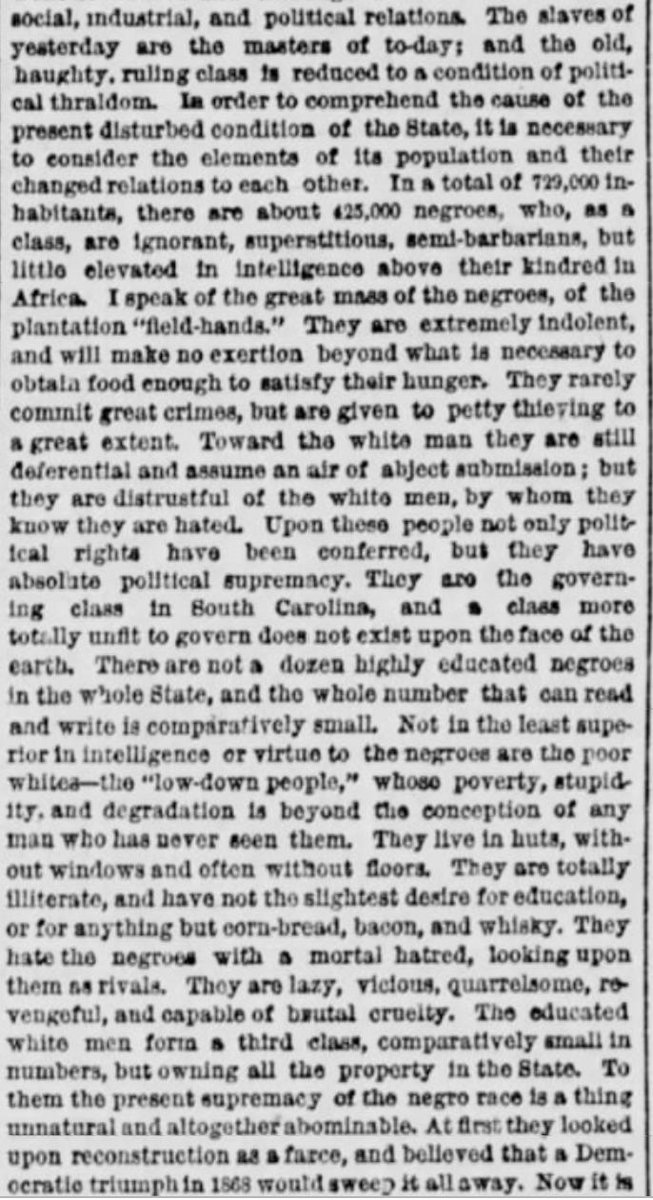
Fears of poor voters worked in the North, too, esp. in NYC, where the GOP hated immigrant voters who tended to support Democrats. In 1871, workers in Paris had formed the Commune and taken over gov't; GOP worried about the same in the US. One warned: /15 

In 1872, a GOP faction wanting to replace U.S. Grant sided with the Ds to argue that protecting black rights was communism. To win reelection, Grant needed to cozy up to Wall Street, which would give him the money to offset the anti-Grant newspapers. As one financier said: /16 

Grant won, and the GOP began to interpret their pro-ordinary man ideology as pro-prosperity, which increasingly meant passing laws to protect business. This meant tariffs, above all, for they protected businesses from foreign competition. But protecting labor was "socialism." /17 

When voters elected D Grover Cleveland in 1884 to curb the power of business, GOP freaked out. In 1882, Grant's former right hand man claimed that the 14th A was designed to protect business; in 1886, SCOTUS agreed. /18 
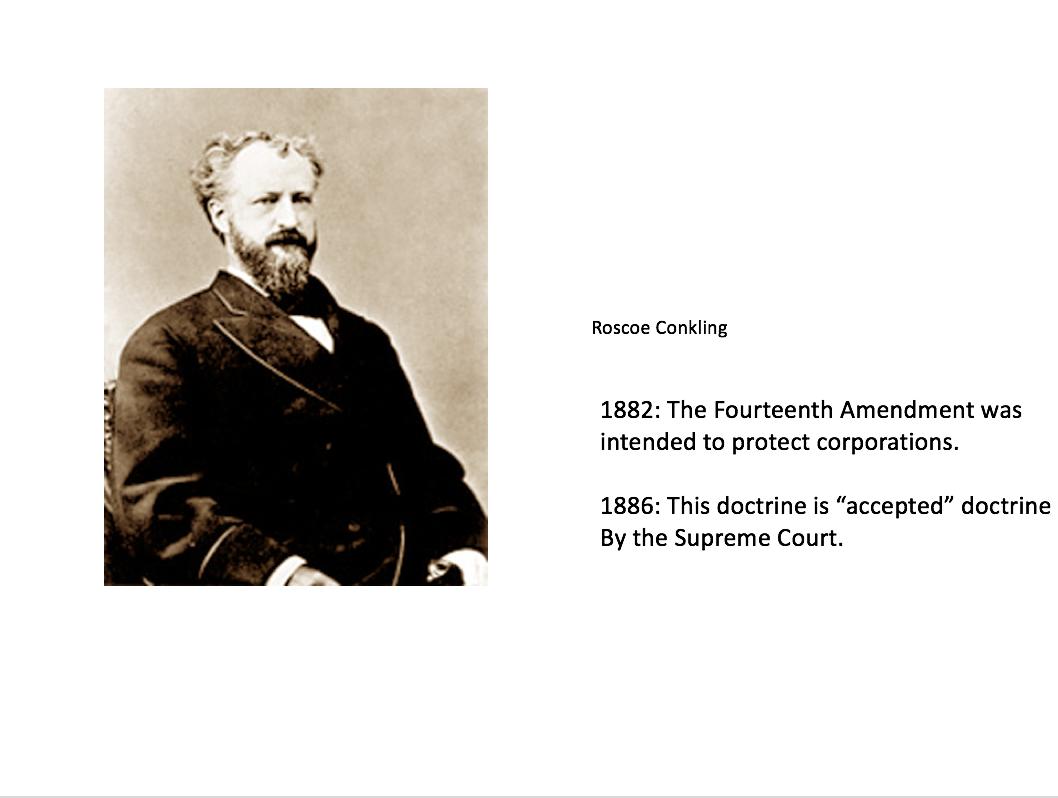
In 1888, GOP invented modern campaign financing (!), warned workers to vote GOP, then when GOP candidate Benjamin Harrison lost anyway, switched votes in the Electoral College to put him into the White House. They believed D Cleveland would destroy America, so they had to. /18 

To guarantee they would never again lose control of the government, GOP under Harrison added six new states: ND, SD, MT, WY, ID, and WA, skewing the Electoral College to this day and leading to the Wounded Knee Massacre. They fudged the 1890 census to make it look legit. /19 

When Cleveland won again in 1892 and got control of Congress GOP warned that communists had taken over. They deliberately crashed the economy ten days before his inauguration. The Panic of 1893 put GOP back in control. /20 
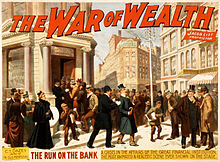
They raised tariffs again, then took over islands that had sugar: Hawaii, Cuba, the Philippines, and so on, without permitting the people there to become citizens, making unincorporated territories and non-citizen Nationals. Now the GOP sounded like the Slave Power. /21 
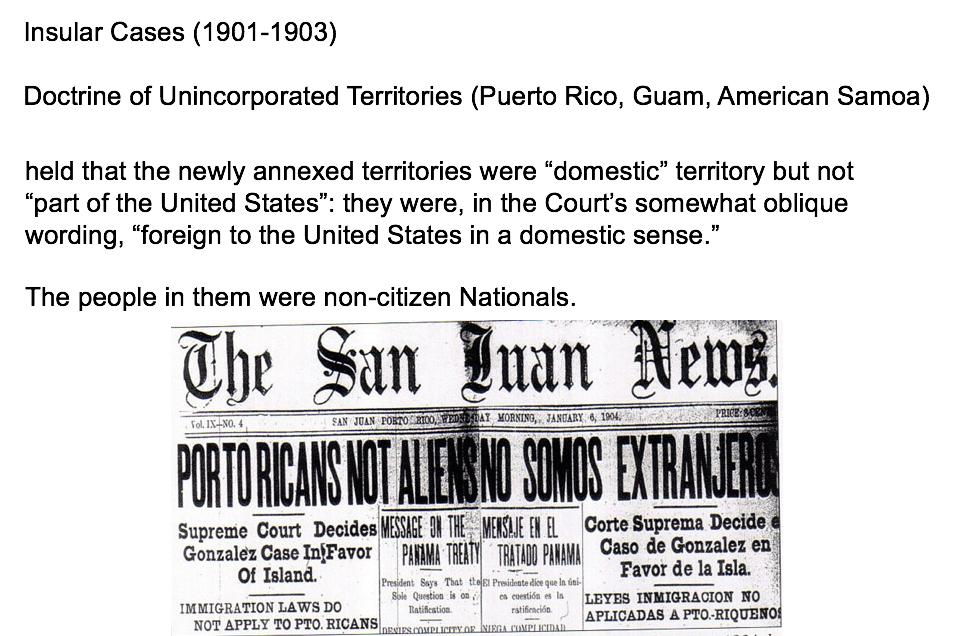
So now the GOP sucked, right? And we could stop here... but not so fast. We must go on. (Later, though. I have to run out for awhile. This is really cool stuff, isn't it?) /22
By the 1900s, the GOP worked for big business, crushing ordinary farmers and workers.
But younger men hated that plutocrats had taken over the nation. They recalled Lincoln's insistence that society was a web, and that gov't must enable those at the bottom to rise. /23
But younger men hated that plutocrats had taken over the nation. They recalled Lincoln's insistence that society was a web, and that gov't must enable those at the bottom to rise. /23

As early as 1884, Robert LaFollette (WI), Henry Cabot Lodge (MA) and Theodore Roosevelt (NY) wanted to curb business. Traditionally, "liberals" demanded small government to protect individualism; they said it would take a big gov't (so the meaning of "liberalism" flipped). /24 
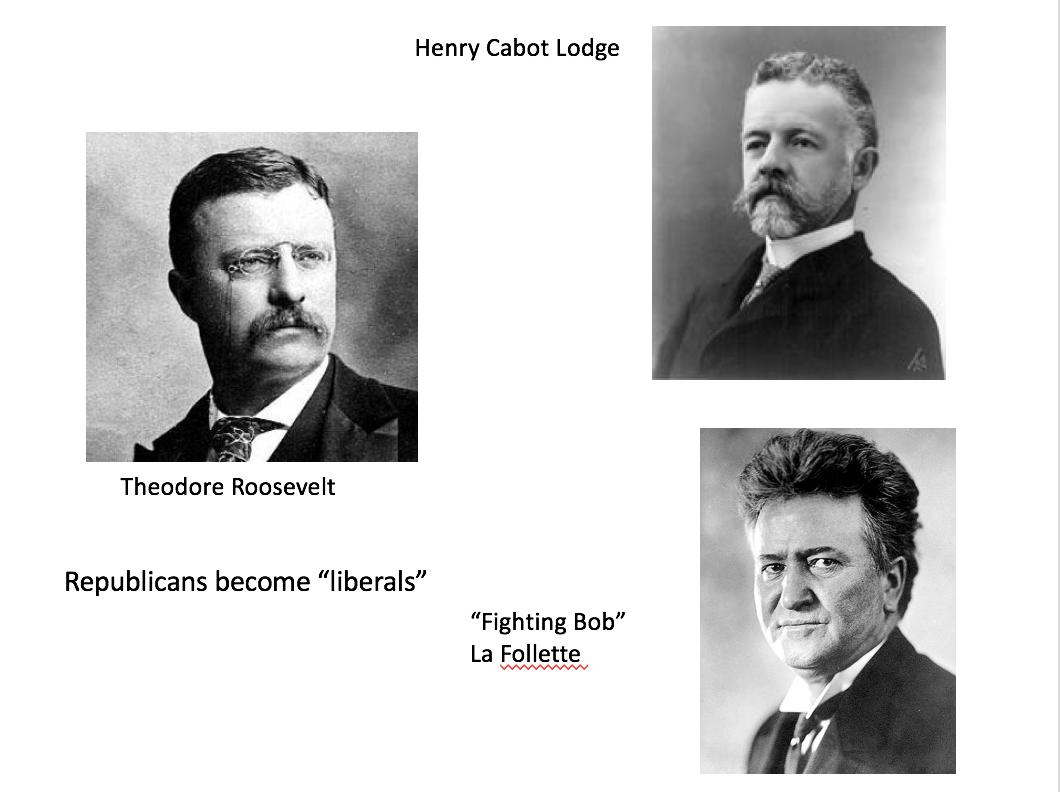
When TR became president, he tried to clean up cities, protect workers, regulate business, + protect public lands. Financier J. P. Morgan flipped out when TR went after Standard Oil Trust. But TR said the government must stop coddling the rich + give everyone a Square Deal. /25 

By 1912, all 4 candidates ran as progressives. But TR and William H. Taft split the GOP, + D. Woodrow Wilson won. GOP was furious, esp. when Ds instantly cut tariffs + imposed taxes instead. WWI means unity, but after, Lodge says WWs wants socialist One-World Gov't. /26
1917 Bolshevik Revolution lets old GOPers again claim activist government was socialism, a ruse to redistribute tax money to black people and immigrants, who were ruining American traditions. Call to end regulation, progressivism. /27 

1920 was a landslide for GOP Warren Harding, and the GOP moved to put business back in charge of government. It cut wartime taxes and put business in charge of gov't bureaus. GOP leaders believed that businessmen alone understood the economy. Naysayers must be socialists. /28 
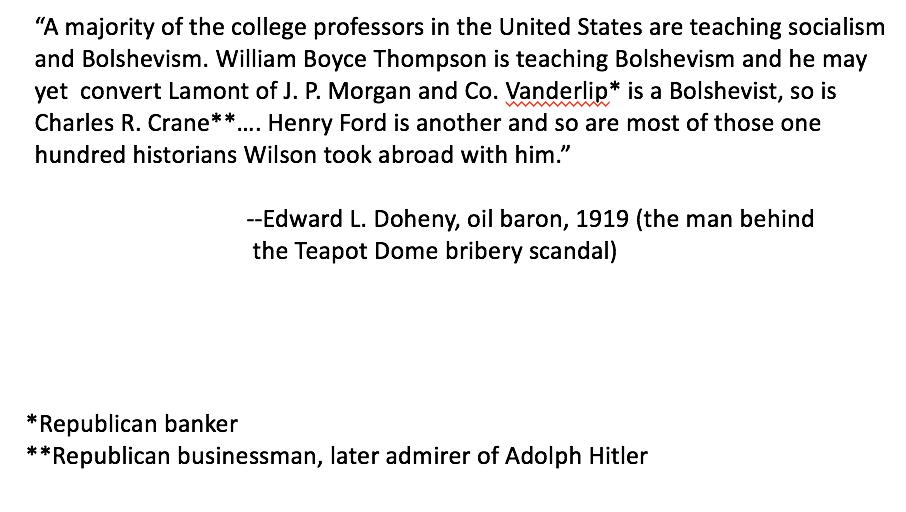
Harding and then Calvin Coolidge turned gov't over to business. It seemed to work. The economy boomed- until it didn't. In October 1929, the bubble burst. GOP had owned the boom; now it owned the bust. President Herbert Hoover tried to brave it out, but voters turned on GOP. /29 

GOP said big gov't expenses, not their own policies, caused the Depression, and called for more cuts. Hoover said gov't intervention was anti-American socialism. But investigations showed major corruption on Wall Street, and Americans WANTED work, but couldn't find any. /30 

When voters elected D FDR in 1932, Hoover was so sure America was through he wouldn't meet with FDR until a White House usher insisted. He kept FDR waiting so long, FDR fell down (he was paralyzed from polio). (This still makes me mad.) At Inauguration, Hoover glowered. /31 
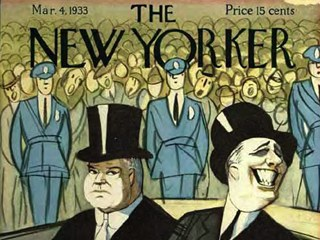
FDR's New Deal regulated business + finance, protected basic social welfare, + promoted infrastructure. Even most GOP recognized their old system was a disaster, and backed active gov't. Led by NY lawyer Thomas Dewey, the new moderates were "me too" Rs, said angry Hoover men. /32 

WWII finished what the New Deal started. Gov't spending made the economy boom, and folks loved it. Also, showing that democracy could beat fascism made the US start to enforce equality. The GOP was often ahead of the Ds on this issue, b/c Ds had to get southern white votes. /33 
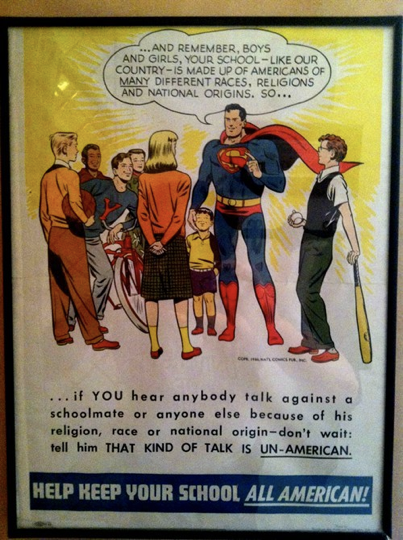
The Hoover faction, led now by William H. Taft's son Senator Robert Taft (OH), still hated the New Deal's active gov't, and set out to erase it. They were so convinced Ams hated this "socialism" they assumed they would toss Ds out. In 1948 some did up headlines too soon. /34 
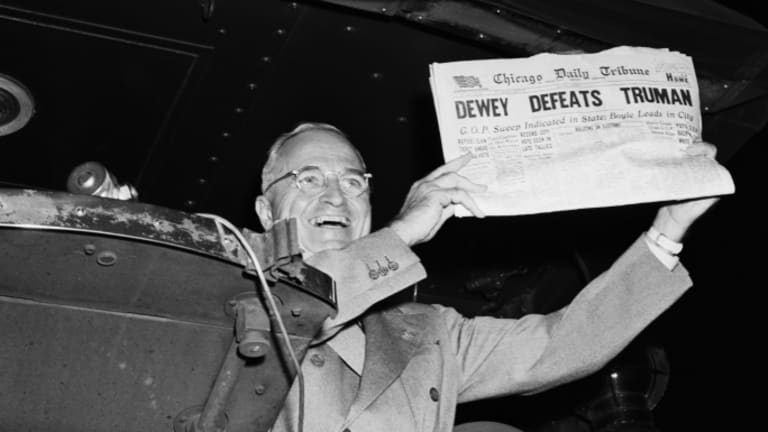
In 1949, Communists took over China + Taft folks accused D's of helping. In 1950, Sen. Joseph McCarthy accused the State Dept of harboring communists. GOP Sen. Margaret Chase Smith (ME) warned against GOP fascism, but Taft wing liked it. No more "me too" Republicanism! /35 

Taft Rs wanted to kill all gov't programs. In 1950, communist NKorea invaded SK, and US leaders thought that would let USSR invade weakened Europe. North American Treaty Organization seemed crucial, but Taft wanted to kill it. WWII hero Dwight Eisenhower was horrified. /36 

Ike ran for 1952 GOP nomination, + won w the help of eastern moderates (esp. Henry Cabot Lodge, Jr. of MA). Fistfights at the convention: Taft men blamed the "Eastern Establishment" for stealing the nomination. Moderates had won, but Taft was irate and his men vowed revenge. /37 

Esp. when Ike governed with a GOP version of the New Deal, called the "Middle Way." He launched the largest public works project in US history- the interstate highway system- tried to expand health care and welfare, and tried to stop communism by funding endangered countries. /38 

Taft men howled... esp. AZ Senator Barry Goldwater, who was born rich but insisted he was a self-made Westerner. He hated regulation of his business as well as taxes, and said Ike had heard "the siren song of socialism." (Top marginal tax rate under GOP Ike was 91%.) /39 

• • •
Missing some Tweet in this thread? You can try to
force a refresh



